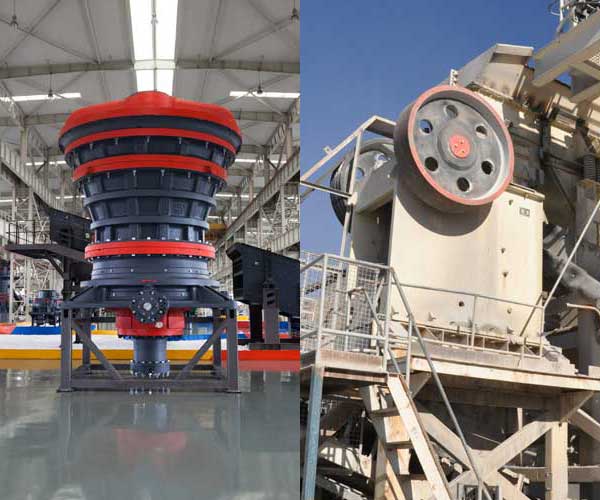
In the realm of crushing equipment, various machines serve distinct purposes to break down rocks and minerals into smaller pieces. Two commonly used machines in this domain are gyratory crushers and jaw crushers. While both devices are designed to crush material, they possess significant differences in their construction, working principles, and applications.
Gyratory Crusher: A gyratory crusher consists of a concave surface and a conical head, typically lined with manganese steel. The inner cone has a slight circular movement but does not rotate. The gyratory crusher is vertically mounted and held within a fixed frame. The crushing chamber is shaped like a truncated cone, with a concave bottom and a gyrating mantle. Material is fed into the top of the chamber and progressively crushed as it travels downward.
Jaw Crusher: A jaw crusher, on the other hand, consists of two jaws, one fixed and the other moving back and forth. The fixed jaw, also known as the stationary or immovable jaw, is mounted in a V-shaped alignment. The movable jaw, or swing jaw, moves in an elliptical motion towards and away from the fixed jaw, exerting pressure on the rock as it moves.
Gyratory Crusher: Gyratory crushers work on the principle of compression. Material is fed into the crushing chamber and subjected to intense pressure between the mantle and concave. This compression force results in the fragmentation of the material into smaller pieces. The gyratory motion of the mantle continuously forces the material to be crushed as it moves downward through the chamber.
Jaw Crusher: Jaw crushers operate based on the principle of reciprocating motion. The movable jaw exerts force on the rock by pressing it against the fixed jaw. This compression force breaks the rock into smaller fragments. The movement of the jaws creates an opening between them, allowing crushed material to fall downward and exit the crushing chamber.
Gyratory Crusher: Gyratory crushers are primarily used in mines and quarries for primary crushing of various hard and abrasive materials. They are well-suited for high-capacity crushing applications. Gyratory crushers excel at handling large rocks and ores with their robust design and high power rating. They are commonly used in the mining industry for crushing ore, and in aggregate plants for primary crushing of large stones.
Jaw Crusher: Jaw crushers are versatile machines suitable for a wide range of applications. They are commonly used in construction, demolition, and recycling industries, as well as in quarrying operations. Jaw crushers are ideal for various materials, including softer rocks, concrete, and asphalt, as they exert less pressure compared to gyratory crushers. They are also popular for their simplicity of operation and maintenance.
Both gyratory crushers and jaw crushers have their unique strengths and weaknesses, making them suitable for different crushing applications. Gyratory crushers offer higher capacity and efficiency, making them ideal for handling larger rocks and ores. However, they are costlier and bulkier. On the other hand, jaw crushers are more versatile, have lower initial costs, and are easier to operate and maintain. They are suitable for a wide range of materials but have lower capacity compared to gyratory crushers.
When choosing between gyratory crushers and jaw crushers, it is essential to consider the specific requirements of the application, the size and hardness of the material to be crushed, as well as factors such as cost, maintenance, and overall operational efficiency. By understanding the differences and evaluating the specific needs, one can make an informed decision on which type of crusher will best meet their crushing requirements.
We have jaw crushers, impact crushers, cone crushers, sand makers and so on.
Mon - Sun, 0:00 - 24:00
24h Online Service
© Zenith. All Rights Reserved. Designed by